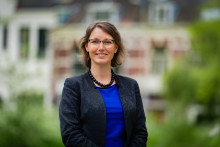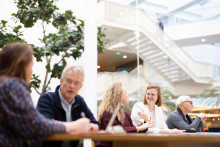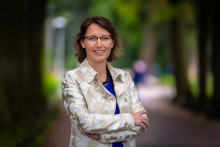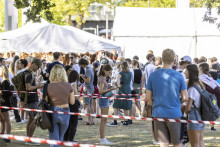machteld roos
Machteld Roos (1975) has served as the Vice-President of the UT Executive Board since the 1st of September 2021. Until then, she was Director Research & Operations of the Environmental Sciences Group (ESG) of Wageningen University & Research.
Roos studied Business Economics at the University of Amsterdam and later on she followed the Nyenrode Supervisory Board Cycle and the IMD Lausanne Leadership programme. She began her career as a consultant for IBM. Since then, she has held various leading positions in both the public and private sectors. She was Chief Financial Officer at NIVEL (the Netherlands Institute for Health Services Research), Head of the Project Office of SNS Regio Bank, Head of Business Operations at SEO Economics Research, Programme Manager at the Business School of the University of Amsterdam and Software account manager at IBM.
Her (former) colleagues describe Machteld Roos as an ‘enthusiastic, energetic and ambitious board member’. You can read her full profile sketch here.
What has your first month at the UT been like?
‘Full of positive impressions, meetings, getting to know the campus, getting lost in buildings and meeting very helpful people. What I find the most impressive is all the inspiring people I meet on campus, as well as at Kennispark and the region.’
Has anything taken you by surprise?
‘You know upfront that there is a lot going on at the UT, but once you are here, you realize it is even more. I’m impressed by the depth and broadness of everything we do and by the community feeling. I strongly believe in communities and ecosystems. I was aware of the community spirit in Twente, but it’s even better to really be here and feel it. I’m still in a phase of discovering and seeing how things really work here in Twente, so that we can make an even stronger university with an even bigger impact.’
How is the role of vice-president different from your previous positions? Can one even prepare for being a member of the Executive Board?
‘I’ve been at the board table from different angles already for many years. I’ve been on supervisory boards, I was a CFO, so I’ve been preparing through experience. I always look at everything from a broad perspective, which is necessary for a board member, but at the same time I try to stay in touch with what is going on. You cannot read everything from paper. My approach is going out, being on campus, making sure I meet and connect with people. It takes a bit of extra time, especially when you don’t know the place, but it is very helpful for me to feel the environment and talk to the people. I want to know what is going on, what are people’s feelings and challenges.’
Do you live in Twente? How familiar are you with the region?
‘I live in Utrecht with my family, but I stay over in Twente a few days a week. My husband studied at Saxion, so I’ve heard about the region and we have come here at least once a year for a long weekend over the last years. So I know a little bit about Twente, but there is still a lot to explore. In the evenings, I often cycle around in the area. I like being outdoors, being active. My two children play field hockey, so I spend my Saturdays on the hockey field. I’m quite energetic and people consider me well-balanced. The theme wellbeing is something I will be an ambassador for. It is really important to be balanced, not only to work hard. That is something I believe we could encourage.’

Do you already know which portfolios you will hold as the vice-president?
‘We will decide later on, but I can tell you that we work together as a team. We will take some topics on as a team of two or three persons, just to make sure we bring the needed expertise and broad perspective. Working as a team and serving the university is the most important. I hope that our teamwork will also inspire others at the UT. I think many people already work in teams, but more interdisciplinary and multifunctional collaboration is really helpful for us to move forward.’
Are there any topics that you are particularly passionate about and that you’d like to emphasize as the vice-president?
‘Wellbeing, talent development, sustainability. Those are of course topics that we will contribute to. Sustainable Development Goals are high on the UT-agenda, but maybe we can look how to bring it even step forward. I’m still discovering and exploring. I have learned not to be too early in choosing a direction. It’s so important to listen to people. You don’t know everything all by yourself. We are a learning organization and I’m also learning. That is part of leadership as well.’
How would you describe yourself as a leader?
‘The UT is a leading organization and we have a strong mission with shaping society, shaping connections and shaping individuals. I hope to inspire people to take personal leadership in any position, and to inspire the community to think of leadership and talent development as important the topics we described in Shaping 2030. I like to look at leadership at all these different levels. My role is to look at where the energy is and how to mobilize the energy towards the topics we decide on together. Energy is the word that has surrounded me. A famous saying that I believe in is “If you want to go fast, go alone. If you want to go far, go together”. I want to empower people, be open and encourage everyone to work in teams and balance their energy.’
'I want to empower people, be open and encourage everyone to work in teams and balance their energy'
Have you always wanted to work in education?
‘When I studied in Amsterdam, I was on the faculty board, on study association boards, I had part-time jobs at universities. I was quite active. It would have been a logical step to take my first job at a university, because many of my family members also work in education, but then I decided to do something different. I was very attracted to IBM, which is a knowledge intensive and innovative organization. It was great, but I missed the education part. I missed the students. I realized that, rather than being the perfect teacher myself, I was better at managing and enjoyed making sure that teachers and others have the right conditions to do outstanding work for students and society. That is why I went back to the university environment. Research and education has always been a big part of my life. I did a little bit of teaching a long time ago. I was teaching at my children’s hockey club, but now they are too good. And a very long time ago, I was also a sports instructor. I like the environment of teaching, students, doing research and trying to make the world better.’
What made you decide to take on this job?
‘The topics of innovation, health, sustainability, community, those are close to my heart and that is why I think the UT fits me very well. The UT brings all of that together. There is focus on bringing knowledge together and finding actual solutions. And the job itself of course. I was ready for it.’
What do you hope your years as vice-president will bring?
‘I see my role as an enabler. I’m serving the university. I hope that after the Covid times we evolve into something balanced, something with new way of working that suits us well. So that we can have the impact we wish for. We need to do that as the whole community. As board, our role is to orchestrate and organize, but everyone is a player. We need to reconnect and connect and reach out to everyone. I want to connect with people and hear their stories. You can’t do everything based on what you read from paper and on screen. That is the trap. Then you find yourself only attending meetings and reading documents. I want to know people’s stories and what is going on. That is the inspiring way of working and what I try to do.’
Photo by Erik Brinkhorst








